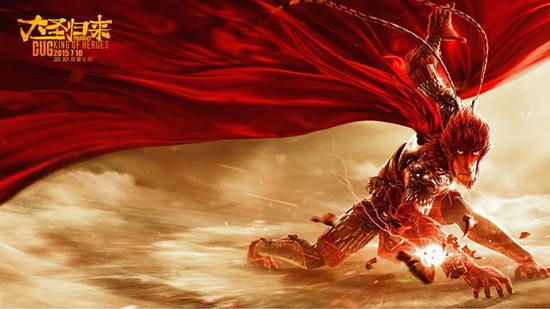(单词翻译:单击)

【电影简介】
大闹天宫后的四百多年间,齐天大圣成了一个传说。在山妖横行的长安城,百姓们在朝夕不保中惶惶度日。孤儿江流儿与行脚僧法明相依为命,小小少年常常神往大闹天宫的孙悟空。
有一天,山妖来劫掠童男童女,江流儿救了一个小女孩,惹得山妖追杀,他一路逃跑,跑进了五行山,盲打误撞地解除了孙悟空的封印。悟空自由之后只想回花果山,却无奈腕上封印未解,又欠江流儿人情,勉强地护送他回长安城。一路上八戒和白龙马也因缘际化地现身,但或落魄或魔性大发,英雄不再。妖王为抢女童,布下夜店迷局,却发现悟空法力尽失,轻而易举地抓走了女童。悟空不愿再去救女童,江流儿决定自己去救。日全食之日,在悬空寺,妖王准备将童男童女投入丹炉中,江流儿却冲进了道场,最后一战开始了。
【音频文本】
With cutting-edge CGI technology, "Monkey King: Hero is Back" conjures the rebellious protector from the childhood of China's younger generations and channels tremendous consumer power. The explosions of positive reviews and box office figures mark the triumphant fusion of nostalgia and modernity, but don't necessarily signal a brighter outlook for Chinese animated films.
Due to a lack of originality in story-writing, Chinese filmmakers often turn to classic texts for inspiration. For that reason, Ming Dynasty novelist Wu Cheng'en's "Journey to the West" has recently witnessed a comeback in popularity as a subject for adaptation. Hong Kong directors Stephen Chow and Cheang Pou-soi have each launched a new series to lukewarm reception but more sequels are still in the making.
Also in the genre of animation, director Wang Chuan's "Kuiba" is loosely based on Wu's story. The ambitious franchise in 3D was designed to challenge Hollywood movies and represented the highest level of production quality, but that has now met with fierce competition in the domestic market.
"Monkey King: Hero is Back" directly appeals to viewers' sense of sight with loud colours, dynamic action scenes and occasionally quiet background shots in the style of traditional Chinese landscape painting. When the Monkey King unleashes his full strength, viewers could almost feel the same excitement as watching a Japanese Shōnen manga story. The refreshing images give many viewers the hope that maybe Chinese animation filmmakers have mastered the modern techniques on par with Hollywood or Japanese counterparts.
Despite a single linear narrative that some claim to be unfit for grown-up audience members, the story does succeed in capturing a hero with moderately complex characters. On the one hand, he is the rebellious hero that revolts against the Heavenly deities; on the other hand, he cherishes the bond with his friends and overcomes himself to protect them. The power dynamics of his relationship with famous Monk Xuanzang, or Jiangliuer in this story, is reversed. The Monkey King here is no longer an unruly beast to be tamed by the righteous and fatherly monk, but a living legend loved by everyone. This variation evokes the memory of Chinese moviegoers, who in their childhood have looked up to the Monkey King as a defiant rebel against traditional patriarchal values.
The visual and emotional allure of the film has turned numerous casual viewers into willing converts. Their fervent suasion has hyped the film's box office income as well as people's expectations for Chinese animated films. But amid the thunderous applause and accolades, it is hard to notice the eight years of hardships and hardwork behind the scene. And before Chinese animation industry can truly turn a page for the better, filmmakers must be willing to endure more such difficult years, notwithstanding a huge influx of investment into their reach.
轻松调频EZFM 微信mrweekly


